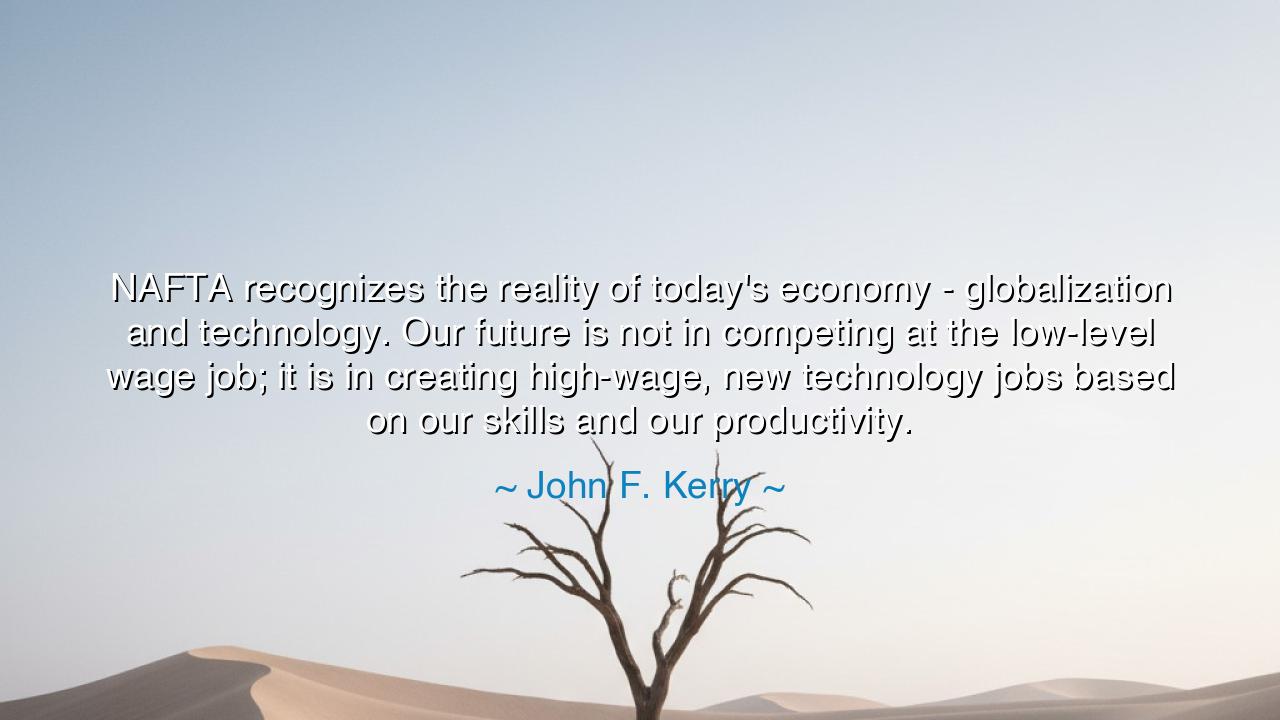
NAFTA recognizes the reality of today's economy - globalization
NAFTA recognizes the reality of today's economy - globalization and technology. Our future is not in competing at the low-level wage job; it is in creating high-wage, new technology jobs based on our skills and our productivity.






Hear the words of John F. Kerry, spoken with clarity about the turning of the ages: “NAFTA recognizes the reality of today’s economy—globalization and technology. Our future is not in competing at the low-level wage job; it is in creating high-wage, new technology jobs based on our skills and our productivity.” In these words lies a vision not only of commerce, but of destiny. For every generation must discern where its strength lies, and must shape its labor not in imitation of the past, but in alignment with the opportunities of the future.
The world has entered an age where borders blur, where trade is no longer confined to villages or kingdoms, but stretches across oceans in an instant. This is globalization—a weaving together of nations, where the craftsman of one land competes with the worker of another, and the marketplace is no longer local but vast as the earth itself. In such an age, to cling to the tasks of low wages and unskilled labor is to be swept aside by the tide. Thus Kerry points the way forward: toward skills, productivity, and mastery of technology, which alone can lift a people into prosperity.
History itself confirms this truth. In the days of the Industrial Revolution, many clung to handcraft while machines began to roar in factories. Those who resisted change fell into poverty, but those who embraced the new ways—learning to use engines, mills, and steam—rose to power and wealth. England, which mastered the machine, became the workshop of the world, while others who refused its march were left behind. So too in our age, the mastery of technology is the key that unlocks the doors of survival and success.
Consider also the tale of Japan after the devastation of the Second World War. With cities in ruins and resources scarce, it could not compete in the raw labor of cheap production. But by embracing skills and productivity, by investing in education, precision, and technology, Japan rose from ashes to become a leader in automobiles, electronics, and innovation. This was the very lesson Kerry speaks of: that the future lies not in low wages, but in the creation of high-value work through knowledge and craft.
Yet within his words lies also a challenge. For such a path requires vision, discipline, and endurance. Skills are not granted by birth; they are forged in schools, in apprenticeships, in lifelong learning. Productivity is not a gift of chance; it is the fruit of organization, discipline, and innovation. And technology, though wondrous, is but a tool, useless unless guided by wise hands and creative minds. Thus Kerry calls not merely for acceptance of globalization, but for transformation of ourselves into artisans of the new age.
The lesson, then, is clear: Do not cling to the fading securities of yesterday’s labor. Embrace the future by cultivating your mind, by honing your skills, by learning to wield the tools of technology. The low road of cheap labor may offer survival, but the high road of knowledge and innovation offers greatness. The nations and individuals who endure will be those who create, not those who merely repeat.
Practical wisdom lies before you: Invest in learning. Do not fear change, but master it. Seek out new skills, whether in craft, science, or art, and let productivity be your shield in the global marketplace. Use technology not as a crutch, but as an instrument of creation. In every field, from the simplest trade to the loftiest science, strive not to be the cheapest, but to be the best.
So let Kerry’s words resound in your heart: Our future is not in competing at the low-level wage job; it is in creating high-wage, new technology jobs based on our skills and our productivity. This is not only the destiny of nations, but of every person who dares to rise above mere survival. Embrace this truth, and you shall not be left behind in the tide of globalization, but will stand among those who transform the impossible into the possible, shaping a future worthy of generations yet to come.






AAdministratorAdministrator
Welcome, honored guests. Please leave a comment, we will respond soon